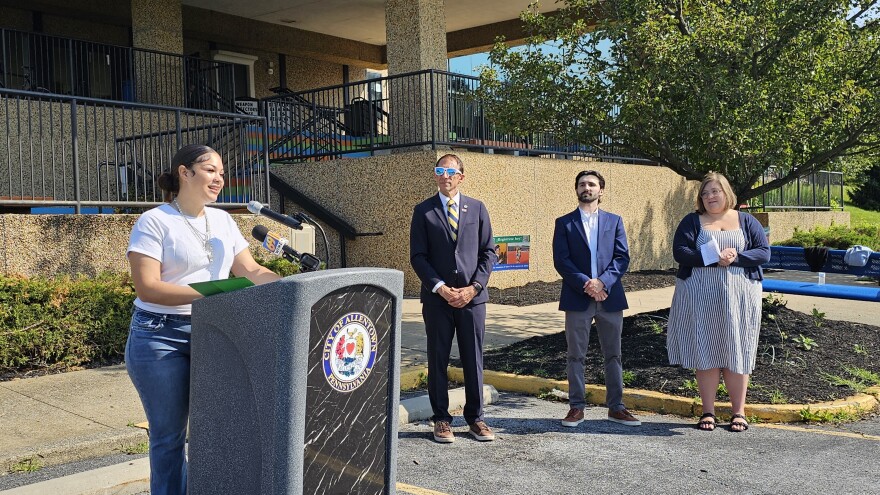ALLENTOWN, Pa. — Young people in Allentown soon will get to work on simple-but-fruitful solutions to address the growing effects of climate change.
Officials on Wednesday announced $5,000 “microgrants” for eight projects that aim to help the city and its residents mitigate and adapt to more regular extreme heat, more intense rainfalls and other changing weather patterns.
Among the winners are projects to repaint the basketball court at Building 21, build several community gardens and plant trees.
“These initiatives are not just projects. They are the seeds of change, planted by the youth of Allentown, and they will grow into a greener and more resilient city for all of us.”Veronika Vostinak, Allentown sustainability coordinator
Crystal Alonso-Colon, a junior at Building 21 — Allentown School District’s magnet high school — is leading the project to repaint her school’s court.
Making its surface a lighter color will reduce its surface temperature and make it a better place for students to play, Colon said.
The project is a step toward reducing the heat-island effect in Allentown, officials said.
Cities often are warmer than surrounding areas because of a lack of greenspace and abundance of surfaces that absorb and hold heat, such as parking lots and roadways, according to the U.S. Environmental Protection Agency.
Alonso-Colon’s project also includes a community cleanup day, pavement repairs and educational signs.
She said she applied for a grant from the city’s Youth Climate Action Fund because she “thought it was the perfect chance to make a difference.”
Allentown this spring launched its Youth Climate Action Fund after getting $50,000 from Bloomberg Philanthropies to fund climate-focused microgrants for youth organizations.
Sustainability Coordinator Veronika Vostinak, since taking the job in March, has led the effort to award that money.
'They are seeds of change'
Fourteen projects applied for microgrants from the city, and just more than half were funded, Vostinak said.
Those eight projects are opportunities for local leaders to collaborate with young people and tap into young people’s “creativity, passion and innovative thinking.”
“These initiatives are not just projects,” she said. “They are the seeds of change, planted by the youth of Allentown, and they will grow into a greener and more resilient city for all of us."
Muhlenberg College senior Maddie Davidson is leading a project to craft an eight-week program promoting tree education and stewardship for fifth-grade students at Muhlenberg Elementary.
She said she hopes to then put that program “into the hands of hands of passionate students, youth, teachers who are incredibly overworked.”
The program will be fully developed to be a resource that teachers “can just plug in” without much added work, according to Davidson, who studies sustainability.
Her project is set to culminate with a tree-planting festival in fall.
Davidson said she worked as an environmental educator at Muhlenberg Elementary as a “passion project.”
Returning to the school with a curriculum funded by Bloomberg and the city “legitimizes” the work she’s done for years without much support, she said.
“Usually in these types of programs that I do, there is no substantial funding,” Davidson said. “We just work with what we have. We use our energy.”
All eight microgrant winners are working toward the same goal, so the tens of thousands of dollars they share “means a better ecosystem” for those working toward local climate-change solutions, she said.
Allentown could be eligible for up to $100,000 in additional funding from Bloomberg Philanthropies if all of the first round is spent by Oct. 31 and projects are done by the end of the year, Vostinak said.


